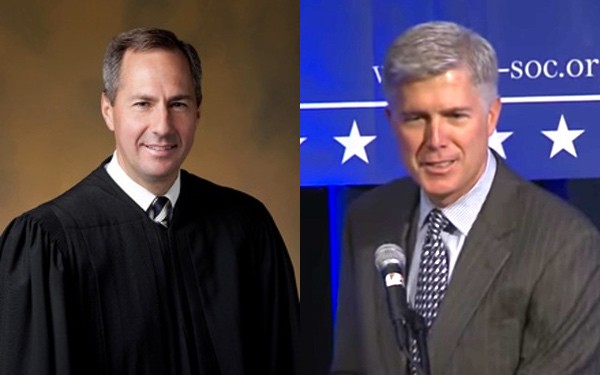
Donald Trump will announce his pick for the U.S. Supreme Court at 8 pm ET on Tuesday.
 Federal appeals court judges Thomas Hardiman (left) and Neil Gorsuch (right) are the top contenders for the nomination, and both traveled to Washington today, according to media reports.
Federal appeals court judges Thomas Hardiman (left) and Neil Gorsuch (right) are the top contenders for the nomination, and both traveled to Washington today, according to media reports.
Writes Bloomberg:
Hardiman and Gorsuch have both met with Trump, as has William Pryor, another appellate judge who remains in contention, the person said. A fourth possibility is federal appeals court judge Raymond Kethledge, the person said.
Hardiman, 51, or Gorsuch, 49, would probably offer an easier route to confirmation than Pryor, whose name Trump invoked on the campaign trail as a possible nominee. Gorsuch was confirmed by a voice vote and Hardiman on a 95-0 vote in the Senate when nominated to their current posts by President George W. Bush.
Either Hardiman or Gorsuch would, in all likelihood, largely track the voting pattern of the late Antonin Scalia, the justice whose seat Trump is looking to fill. The new justice could provide an outspoken voice for the court's conservative wing for a generation.
Pryor is by far the most extreme anti-LGBT of those mentioned and has argued for the criminalization of gay sex, among other things.
Hardiman's LGBT rights record is less clear.
He wrote for the court in allowing a gender-stereotyping claim by a gay man who described himself as “effeminate” to go forward, reversing the district court's grant of summary judgment in favor of the company where the man worked, and which ultimately fired him. Hardiman explained that the plaintiff was “harassed because he did not conform to” the company's “vision of how a man should look, speak, and act – rather than harassment based solely on his sexual orientation.” Hardiman agreed with the company that “every case of sexual orientation discrimination cannot translate into a triable case of gender stereotyping discrimination.” But at the same time, he observed, the company “cannot persuasively argue that because Prowel is homosexual, he is precluded from bringing a gender stereotyping claim.”
And Gorsuch has not made a direct ruling in a LGBT rights-related case, though the did rule in the Hobby Lobby case (contraception related), on the pro-Christian side:
Some of the most high-profile cases in which Gorsuch has cast a vote have involved the religion clauses of the Constitution (those prohibiting the establishment of religion and creating a right to free exercise), as well as congressional statutes expanding protection for religious adherents (known as RFRA and RLUIPA). Followers of the Supreme Court will recognize two recent cases in which Gorsuch participated on the 10th Circuit, Hobby Lobby Stores v. Sebelius and Little Sisters of the Poor Home for the Aged v. Burwell. In Hobby Lobby, Gorsuch wrote a concurrence in the en banc 10th Circuit that sided with the company and its owners. He stressed the need to accept these parties' own conceptions regarding the requirements of their faith, and held (among other things) that they were likely to prevail on claims that the contraception mandate in the Affordable Care Act substantially burdened their religious exercise in violation of RFRA. This position was largely vindicated in the subsequent decision by the Supreme Court. Thereafter, in Little Sisters of the Poor, Gorsuch joined a group of 10th Circuit judges who dissented from denial of rehearing en banc when a panel of the court of appeals ruled against the Little Sisters on their RFRA claims about the same ACA mandate. There, again, the point was that the 10th Circuit had shown insufficient deference to the Little Sisters' own articulation of the tenets of their religious beliefs. That position, too, was at least partially vindicated by the Supreme Court when it decided that the Little Sisters' religious beliefs probably could be accommodated while still affording full and equal contraceptive coverage to their employees, and directed the parties and courts to consider such a solution on remand. Simply put, in cases that closely divided his court and the Supreme Court, Gorsuch has shown himself to be an ardent defender of religious liberties and pluralistic accommodations for religious adherents.



